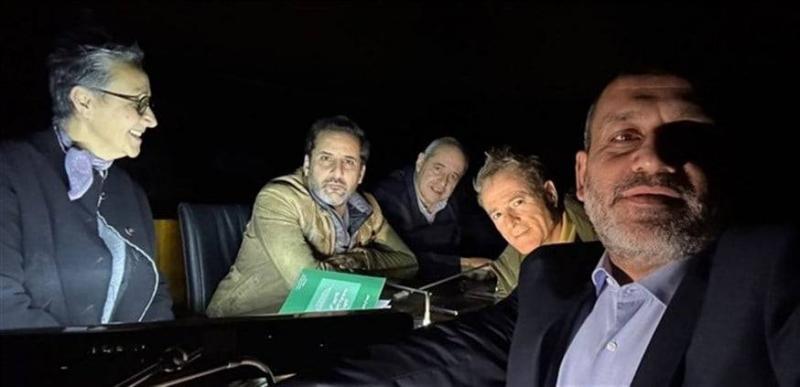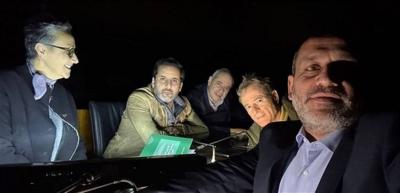It may be significant for MPs in the House of Representatives to sleep, but what matters more is who they vote for. If the intention is to pressure the presidency and other MPs to elect a president, it would be more effective to exert pressure by directing the votes during election sessions. A parliamentary sit-in, while voting continues as it is, does not change anything and keeps the situation stagnant, unless it leads to the closure of the parliament and no new election sessions are called, waiting for a solution that may never come. The key to the parliament is held by Speaker Nabih Berri. His calls for public sessions to elect a president every Thursday, as he has done since he set the first session date, resemble a lack of invitation because he knows that what happens during the sessions will not change the issue of obstructing the election. President Berri has distanced himself from being accused of obstruction by calling for the first session within the constitutional deadline and before the last ten days of former President Michel Aoun's term, so he could later control the calls for the sessions. This is not new; this electoral political maneuver has been adopted for every presidential election. After the term of President Emile Lahoud ended and after the term of President Michel Sleiman, it is being repeated today.
The game of deliberate vacancy during every presidential election means that obstruction reigns supreme. The constitution has outlined a mechanism to fill the presidential vacuum resulting from the empty presidency to ensure the functioning of institutions, based on the premise that there is no vacuum, only posts that can be filled constitutionally. However, this vacancy was considered from the perspective of ensuring institutional continuity, and if a vacuum or vacancy occurred due to compelling, exceptional, or sudden circumstances, such as the death of the president, resignation, or illness preventing him from exercising authority. However, intentionally and willfully vacating the presidency of its president is considered a departure from the constitution and a planned, systematic political coup that hides malicious and bad intentions. Thus, repetition is deemed a crime against democracy.
The election of a president is being obstructed to allow the government collectively to assume the role of the president, stating that matters continue without a president. Before the Taif Agreement, Lebanon did not face such a situation except in two phases: the first was when President Bishara al-Khoury resigned, and Army Commander General Fouad Chehab was tasked with forming a transitional government that ensured the election of a new president within three days. When President Camille Chamoun was elected on September 23, 1952, there was no discussion about the possibility of obstructing the quorum or preventing a two-thirds majority. The democratic process, albeit imperfect, was in effect. The president did not need to obtain two-thirds of the votes; rather, he needed a simple majority of half plus one after achieving a quorum. The opposition was not meant to obstruct the election but to ensure a quorum for the election to occur in a democratic parliamentary and political manner, as the opposition should complete the political structure based on proper power circulation rather than deliberately obstruct it.
If this principle had been followed, for instance, the Chehabist approach would have obstructed the election of MP Sleiman Frangieh on August 17, 1970. Attempts to obstruct the quorum began to be practiced negatively, even if it was a merely formal constitutional right, beginning with the election session of President Elias Sarkis on May 8, 1976, when force was used to prevent MPs from reaching the parliament, and the same happened with the elections for President Bashir Gemayel and again in 1988 when the Syrian regime attempted to impose the election of the president it desired. Since that time, the equation flipped, and the goal became: either you elect the president that this regime wants or there will be no elections. After 2005, the equation became: either you elect the president that Hezbollah wants, or there will be no elections.
Hezbollah has defined what it wants from the president by stating that it seeks a brave president who stands on his feet and does not submit to the American decision, meaning that this president should be of Hezbollah's making and subordinate to it. Since the end of President Emile Lahoud's term, Hezbollah adopted this strategy that does not deviate from its will to have this president within its system. The issue is not about the two-thirds majority of 86 MPs that is discussed for securing the constitutional quorum for the election session, which is considered necessary to say that this matter requires prior agreement on this president, meaning that a quorum can only be secured if there is agreement on the new president, while the reality should be that this quorum should be secured as part of the rules of the democratic game and the completion of the political contract between the ruling majority and the opposition, which represent the two banks of democracy. However, in Hezbollah’s calculations and its affiliated team, there is no democracy and no circulation of power, only negative obstruction and blackmail.
It is not limited to relying solely on the two-thirds majority; more than that, it jumps to another consideration, which is the Shiite vote for any new president. Even if 86 MPs secure a quorum for a certain candidate and even if there is a majority of 65 votes for the election, another theory for obstruction is adopted, stating that a president cannot be elected without the vote of any Shiite MP. With this unconstitutional and non-consensual theory, obstruction becomes dependent on the Shiite parliamentary “ghetto” controlled by Hezbollah and the Amal Movement. Therefore, the strategy of this duo during the elections of May 15 and previously in the elections of 2009 was to ensure that this Shiite representation was not breached before the second aspect of this strategy, which is obtaining the parliamentary majority or the obstructive third in any case.
Before sleeping in the parliament, many MPs associated with the opposition or change forces fell into the trap of the two-thirds majority by aligning with the obstruction, accepting the theory of the main obstructors, and stating that for the president to be elected, a majority starting from 86 MPs must agree. This number is not a prerequisite for the election but for securing the quorum. The 86 MPs are not supposed to agree on a single presidential candidate; rather, they should ensure the democratic game conditions to elect a president with a majority of 65 votes or more to serve the democratic game and ensure power rotation. The elected president is supposed to become the president for all of Lebanon and for those who voted for him and those who did not.
On this basis, the naming of the prime minister and the formation of the government should occur. However, the rules that were adopted which led the entire situation to collapse were through securing ministerial shares within the government so that institutions turned into fiefdoms, which naturally led to this collapse. In this sense, the division of the state within its institutions is more dangerous than its geographic division on the ground. This division begins with the monopoly of Shiite representation and the attempt to impose its will on the other sectarian and political components, and it extends to the other state institutions. Within this framework, one can understand the nature of the proposal to hold the Christians responsible for the vacancy in the presidency and calling on them to agree on a president so that others would accept the name they agree upon, based on the premise that the Shiites select the Speaker of the Parliament, the Sunnis the Prime Minister, and the Christians the President, and after that, where can one speak of a unified state of institutions?
### No Cover for Obstruction
Sleeping in the parliament should be part of a complete, progressive plan that culminates in electing a president who represents national sovereignty and is capable of undertaking a rescue mission, rather than based on agreeing on a president based on the fear of collapse. This agreement could be on any president just to have someone in the presidential seat but without a rescue plan. Hence, the sit-in should be larger than just an objection to obstruction as a passing event; rather, it should be based on objecting to obstruction as a strategy adopted in order to build a counter-strategy against it. This strategy should begin with securing 65 votes for a presidential candidate like Michel Moawad or anyone else who can carry the same project and specifications in coordination with Moawad and those who nominated him and continue to nominate him, rather than reaching an agreement with those who refuse his candidacy and insist on agreeing on the candidate they stick to alone.
Therefore, the sit-in should start only after securing this step to be effective and to genuinely act against those obstructing the election of a president who possesses the majority that brings him to Baabda Palace, regardless of the two-thirds majority which then becomes a tool for snatching democracy instead of being a tool for affirming it by recognizing the rights of the majority. Thus, sleeping in the parliament must be accompanied by a movement outside the parliament that does not drop below this ceiling to prevent the parliament from becoming a graveyard for democracy and sleeping in it from resembling sleep in cemeteries filled with terrifying nightmares of potential scenarios that could unfold. Therefore, it might be essential where the opposing MPs sleep, but what matters most is who they vote for before the sit-in, not after it. If this is not the case, sleeping in the parliament becomes as if it serves to cover the continuation of the obstruction process.




